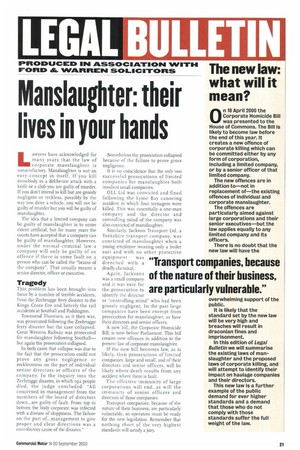Manslaughter: their lives in your hands
Page 23

If you've noticed an error in this article please click here to report it so we can fix it.
Lawyers have acknowledged for many years that the law of corporate manslaughter is unsatisfactory. Manslaughter is not an easy concept in itself. If you kill somebody in a deliberate attack with a knife or a club you are guilty of murder. If you don't intend to kill but are grossly negligent or reckless, possibly by the way you drive a vehicle, you will not be guilty of murder but you will be guilty of manslaughter.
The idea that a limited company can be guilty of manslaughter is to some extent artificial, but for many years the courts have accepted that a company can be guilty of manslaughter. However, under the normal criminal law a company will only be guilty of an offence if there is some fault on a person who can be called the "brains of the company". That usually means a senior director, officer or executive.
Tragedy
This problem has been brought into focus by a number of terrible accidents, from the Zeebrugge ferry disaster to the Kings Cross fire and latterly the rail accidents at Southall and Paddington.
Townsend Thoresen, as it then was, was prosecuted following the Zeebrugge ferry disaster but the case collapsed. Great Western Railway was prosecuted for manslaughter following Southall— but again the prosecution collapsed.
In both cases that collapse was due to the fact that the prosecution could not prove any gross negligence or recklessness on the part of individual senior directors or officers of the company. In the inquiry into the Zeebrugge disaster, in which 592 people died, the judge concluded: All concerned in management from the members of the board of directors down...are guilty of fault. From top to bottom the body corporate was infected with a disease of sloppiness. The failure on the part of...management to give proper and clear directions was a contributory cause of the disaster." Nonetheless the prosecution collapsed because of the failure to prove gross negligence.
It is no coincidence that the only two successful prosecutions of limited companies for manslaughter both involved small companies.
OLL Ltd was convicted and fined following the Lyme Bay canoeing accident in which four teenagers were killed. This was essentially a one-man company and the director and controlling mind of the company was also convicted of manslaughter.
Similarly, Jackson Transport Ltd, a Yorkshire transport company, was convicted of manslaughter when a young employee wearing only a boiler suit and with no other protective equipment was drenched with a deadly chemical.
Again, lacksons was a small compafny
and it was easy tot
the prosecution to are particularly vulnerable.
identify the director or "controlling mind" who had been grossly negligent. In the past large companies have been exempt from prosecution for manslaughter, as have their directors and senior officers.
A new bill, the Corporate Homicide Bill, is now before Parliament. This bill creates new offences in addition to the present law of corporate manslaughter.
If the new bill becomes law, as is likely, then prosecutions of limited companies, large and small, and of their directors and senior officers, will be likely where death results from any accident where there is fault.
The effective immunity of large corporations will end, as will the immunity of senior officers and directors of those companies.
Transport companies, because of the nature of their business, are particularly vulnerable, so operators must be ready for the new legislation. Remember that nothing short of the very highest standards will satisfy a jury.








































































































